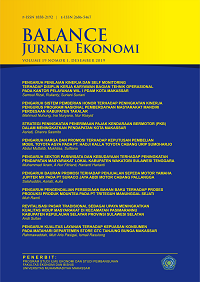THE INFLUENCE OF ORGANIZATIONAL CULTURE, MOTIVATION, AND WORK DISCIPLINE ON EMPLOYEE PERFORMANCE DURING THE COVID-19 PANDEMIC IN PT. SARANA TITIAN PERMATA 1
DOI: https://doi.org/10.26618/jeb.v17i2.6483
Abstract
In the era of globalization, competition between companies is getting sharper, so it requires companies to always be the best. The increasingly fierce competition also shapes the development of increasingly increasing technology and information, resulting in global and comprehensive competition. Therefore, we need workers who really want to work and are able to survive in oil palm plantations. This study aims to determine (1) Does Organizational Culture partially affect the performance of employees at PT. Sarana Titian Permata 1, (2) Does motivation partially affect the performance of employees at PT. Sarana Titian Permata 1, (3) Does Work Discipline partially affect employee performance at PT. Sarana Titian Permata 1. The method of collecting data is through questionnaires distributed to employees of PT. Sarana Titian Permata 1. The samples taken were 54 respondents using the saturated sample technique. The data obtained were then processed using a computer software analysis tool, namely SPSS version 23. This analysis includes validity test, reliability test, multiple regression analysis test, classical assumption test, and statistical test through t statistical test, F statistical test, and the coefficient of determination (R2 ). The results of the t-statistical test indicate that Organizational Culture has a positive and significant effect on employee performance with a significance (Sig.) of 0.000 less than 0.05 (α), then motivation has a positive and significant effect on employee performance with a significance (Sig.) of 0.023. smaller than the value (α) of 0.05, while Work Discipline has no significant effect on employee performance with a significance (Sig.) of 0.547 greater than the value (α) of 0.05. Then the F statistic test and the coefficient of determination (R2) show that organizational culture, motivation and work environment simultaneously affect employee performance with a contribution of 69.7%. While the remaining 30.3% is explained by other independent variables that are not included in the analytical model of this study.
References
Ananta I Ketut Febri dan I G. A. Dewi Adnyani (2016), “Pengaruh Disiplin Kerja Dan Budaya Organisasi Terhadap Produktivitas Kerja Karyawan Pada Villa Mahapala Sanur-Denpasar, E-Jurnal Manajemen Unud, Vol. 5, No. 2, 2016: 1103-1130
Darsono, P. (2010). Budaya Organisasi. Jakarta : Nusantara Counsulting.
Irawati Rusda dan Ezra Pelita Silalahi (2015), “Pengaruh Disiplin Kerja Dan Budaya Organisasi Terhadap Kinerja Operator Produksi Di PT XXX”, ejournal Politeknik Negeri Batam Arifin, Rois. dkk. Perilaku Organisasi. Malang.
Gujarati, Damodar. N and Porter, Dawn C.(2013). Dasar-dasar Ekonometrika.
Jakarta: Salemba Empat.
Handoko, T. H. (2001). Manajemen Personalia dan Sumber Daya Manusia.
Yogyakarta: BPFE Press.
Jones, Gareth, R . & George, Jennifer M. (2008). Contempory management ( fifth edition). USA: McGRA Whill – International.
Kotter, John. P dan Heskert, James. L. (1992). Corporate Culture and Performance, The Free Press, New York,USA.
Empat. Majalah Bisnis dan Manajemen. Eksekutif. No.327, November 2010. Liana Yuyuk dan Rina Irawati (2014), Peran Motivasi, Disiplin Kerja Terhadap
Komitmen Karyawan Dan Kinerja Karyawan Pada Perusahaan Air Minum Di Malang Raya, Jurnal Manajemen dan Akuntansi Volume 3, Nomor 1,
Mathis, Robert L., dan Jackson, John H.(2006). Manajemen Sumber Daya manusia. edisi 10. Alih Bahasa: Diana Angelika, Salemba Empat, Jakarta.
Masambe, Fimce, Agus soegoto & Jacky Sumarauw. 2015. “Pengaruh Gaya Kepemimpinan, Budaya Organisasi dan Inovasi Pemimpin Terhadap Kinerja Karyawan Daihatsu Kharisma Manado”. Universitas Sam Ratulangi. Vol.3, No.3, 2015
Manullang, M. (2004). Manajemen Personalia. Edisi ke 3.Yogyakarta: Gadjah Mada University Pers.
Ndraha,Taliziduhu.(2010). Budaya Organisasi Jakarta: PT. Rineka Cipta.
Putra 2014. “Pengaruh Budaya Organisasi Terhadap Kinerja Karyawan Pada Toserba XYZ Bandung.Bandung: Universitas Telkom”. Vol.1, No.3 2014.
Pratama, Yoga. (2012). Pengaruh Budaya Organisasi Terhadap Kinerja Pegawai Pada Kecamatan Nanggung Kabupaten Bogor. Laporan Penelitian, Tidak dipublikasikan.
Ray Raymundus I Wayan (2015), “Pengaruh Disiplin Kerja Dan Budaya Organisasi Terhadap Kinerja Pegawai Negeri Sipil Pada Kantor Kecamatan Kelapa Gading Di Jakarta Utara”, IJPA-The Indonesian Journal of Public Administration Volume 1 , Nomor 2.
Rosadi, D. (2012). Ekonometrika & Analisis Runtun Waktu Terapan. Yogyakarta: Andi.
Sani, Achmad.Supriyatno dan Machfudz, Masyhuri. (2010). Metodologi Riset Manajemen Sumber Daya Manusia. Cetakan I. Malang: UIN – MALIKI PRESS.
Sani, Achmad.Supriyatno dan Maharani, Vivin. (2013). Metodologi Penelitian Manajemen Sumber Daya Manusia Teori, Kuesioner dan Analisi Data. Cetakan II. Malang: UIN – MALIKI PRESS.
Shinta (2018) Metode Penelitian Kuantitatif dengan Jenis Eksplanatory Malang : ISSN 2303-1174 P. Lampengan.
Siagian, S. P. (2007). Manajemen Sumber Daya Manusia, Cetak14. Bumi Aksara, Jakarta.
Sutrisno, Edy. ( 2013 ). Budaya Organisasi, Jakarta : Cetakan ke 3 Kencana Prenada Media Group.
Wanjiku, Njugi Anne.; Agusioma, Nickson Lumwagi. (2014). Effect of Organization Culture on Employee Performance in Non Govermental Organizations. Retrieved Agustus 18, 2015 from http://ijrsp.org/research- paper-1114/ijrp-p3503.
Yuliani, Rahmawati. “Pengaruh Kepemimpinan, Motivasi dan Lingkungan Kerja Terhadap Kinerja Karyawan PT. BCA Syariah Semarang” Vol.8 No.3, Oktober 2016













